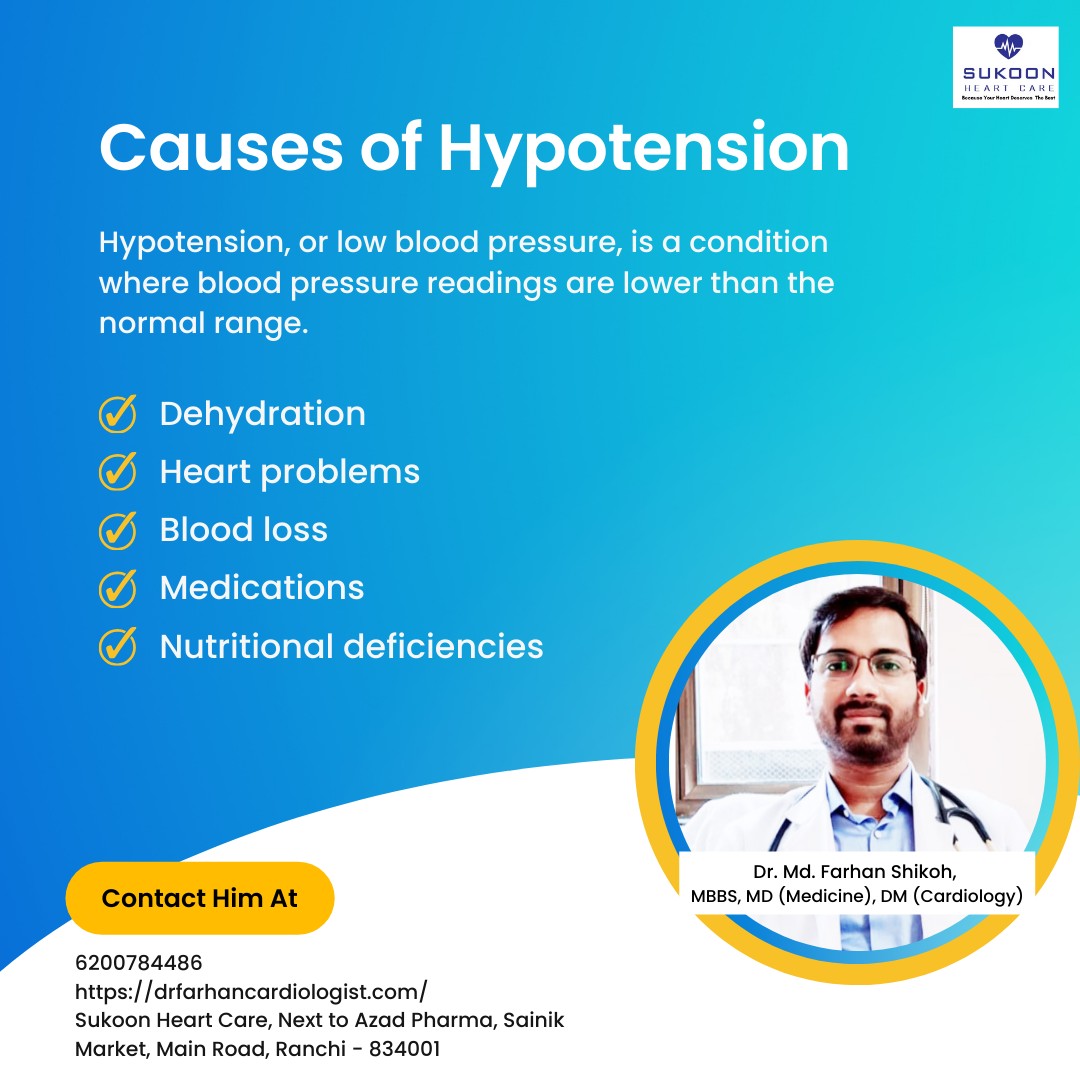Understanding the Causes of Hypotension
Hypotension, commonly known as low blood pressure, is a condition where blood pressure readings fall below the normal range, typically considered to be below 90/60 mmHg. While many people may experience occasional low blood pressure without any symptoms, chronic hypotension can lead to serious health issues if not addressed. Dr. Md. Farhan Shikoh, the Best Diabetes Doctor in Ranchi and a renowned cardiologist, sheds light on the various causes of hypotension.
1. Dehydration
One of the primary causes of hypotension is dehydration. When the body loses more water than it takes in, it can lead to a decrease in blood volume, resulting in lower blood pressure. Factors contributing to dehydration include excessive sweating, fever, vomiting, and diarrhea. Maintaining adequate hydration is crucial, especially during hot weather or while engaging in strenuous physical activities.
2. Nutritional Deficiencies
Certain nutritional deficiencies can also lead to hypotension. A lack of essential vitamins and minerals, particularly vitamin B12 and folate, can impair the body’s ability to produce red blood cells, which are vital for maintaining healthy blood pressure levels. A well-balanced diet rich in these nutrients is essential for overall cardiovascular health.
3. Heart Problems
Heart conditions, such as bradycardia (abnormally slow heart rate), heart valve issues, or heart attack, can affect the heart's ability to pump blood effectively, leading to low blood pressure. Individuals with underlying heart conditions should monitor their blood pressure regularly and consult a healthcare professional if they notice any concerning symptoms.
4. Hormonal Imbalances
Hormonal changes can significantly influence blood pressure. Conditions such as adrenal insufficiency (Addison's disease) or an underactive thyroid (hypothyroidism) can disrupt hormonal balance and contribute to hypotension. Regular check-ups and blood tests can help detect these imbalances early.
5. Medications
Certain medications can also lead to low blood pressure as a side effect. Diuretics, beta-blockers, and antidepressants are among the common medications that may lower blood pressure. Patients taking these medications should communicate with their healthcare providers to ensure that their blood pressure is being monitored effectively.
6. Postural Changes
Postural hypotension, or orthostatic hypotension, occurs when a person experiences a sudden drop in blood pressure upon standing up from a sitting or lying position. This condition can be particularly common among older adults and those taking certain medications. To manage this, it is advisable to stand up slowly and stay hydrated.
Conclusion
Understanding the various causes of hypotension is essential for effective management and prevention. Dr. Md. Farhan Shikoh emphasizes the importance of regular check-ups and consultations to identify any underlying issues contributing to low blood pressure. For personalized advice and treatment options, individuals can contact Dr. Shikoh at Sukoon Heart Care, Sainik Market, Main Road, Ranchi, Jharkhand: 834001, or reach him at 6200784486. More information can be found on his website https://drfarhancardiologist.com/.
By recognizing the signs and symptoms associated with hypotension and understanding its causes, individuals can take proactive steps towards maintaining optimal heart health.
#bestcardiologistinranchi #bestheartdoctorinranchi #bestheartspecialistinranchi #bestdiabetesdoctorinranchi #sukoonheartcare #ranchi #drfarhanshikoh












